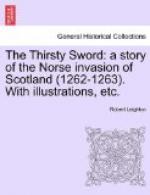“Right glad am I to hear it,” said the knight, “for he who is prepared has half his battle fought.
“Ah, Allan,” he added, seeing young Redmain already on board, “I was but now about to ask if you had not yet come across from Kilmory. Where is Sir Oscar this morning?”
“Hard at work in the fields,” answered Allan. “And he bade me tell you that should King Alexander commission you on any dangerous enterprise, there are threescore of fishermen at your service over at Kilmory.”
“’Tis well. And now I see you have not forgotten the king’s tribute,” said Sir Piers, as he observed the pair of gerfalcons that Allan was tending. “Could his Majesty receive a like tribute from other vassals, methinks there would be need to supply him also with a few score of herons to fly them against. But the tribute customs are well ordered. One sends a hart, another a hound, one a heron, and another a hawk. My lord of Arran’s offering is but two dead golden eagles — and for the matter of that his Majesty might have all the eagles in Arran, and welcome, for we have over many of them.”
“Stand by your oars, my lads!” cried Kenric, balancing himself upon the gunwale and stepping aft. “Now, Duncan, heave off the ropes, you laggard. So. Ready all!”
Then the boatswain, standing by the mast upon the centre gangway running fore and aft between the two sets of rowers, blew his horn, and the rowers pushed up their oars at arms’ length that the blades might catch the water, then springing upon the thwarts which they gripped with their bare feet they threw themselves back with all their weight and strength, and the ship began to glide through the clear water. And so, springing up again as before for another pull, the men went to their hard work with a will, singing a wild Gaelic boat song in measured time with the strains of Dovenald’s harp, and the galley, with ever-increasing speed, sailed out into the mid-bay. When there was a good way on her the work at the oars became easier and the song sank down into a subdued crooning sound that was soothing to hear.
The shipmaster steered them out into the broader sea past Toward Point, and two hours’ good rowing up the firth brought them abreast of the fortress of Dunoon. When the course was turned eastward the oars were shipped and the great sail was set to catch the light western breeze, and then they went speeding up the Clyde to Dumbarton, whose strong-built castle stood upon a high steep rock on the northern bank of the river.
“Alas!” said Sir Piers de Currie, as he turned his clear gray eyes towards the battlements, “much do I fear that we are doomed to disappointment. The King has not arrived! Had it been so we should have seen the brave flag of the Scottish lion flying upon those towers.”
“That were indeed a disappointment,” said Allan Redmain regretfully.
“Nevertheless,” said Kenric, “we can at least leave the tribute at the castle, and it may be that the warden can tell us when his Majesty is expected.”




